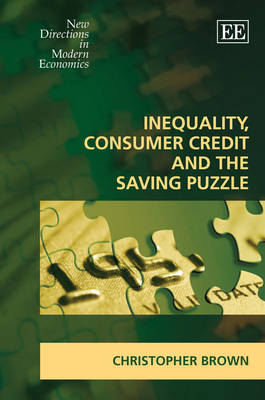
Inequality, Consumer Credit and the Saving Puzzle
Seiten
2008
Edward Elgar Publishing Ltd (Verlag)
978-1-84720-509-4 (ISBN)
Edward Elgar Publishing Ltd (Verlag)
978-1-84720-509-4 (ISBN)
Providing much needed context for current events like the sub-prime mortgage crisis, this timely book presents a vision of an economy evolved to greater dependence on consumer credit and analyzes the trade-offs and risks associated with it. While synthesizing the Keynesian theory of consumption with the Institutional theory of habit selection (brought up to date with new knowledge from evolutionary biology and neuroscience), this book represents an in-depth treatment of the macroeconomic dimensions of consumer credit and implications of recent financial innovations from a non-traditional economic approach.Some of the effects of consumer credit dependence include the potential for illiquidity in markets for debt-collateralized securities, sub-prime contagion, or the possibility of a Minsky-type debt deflation episode. The author also argues that a sharp increase in borrowing by US households over the past 20 years, aided by financial innovations such as the securitization of consumer loans and sub-prime lending, have lessened the harmful consequences of income inequality, and that the collapse of personal saving after 1993 is actually a gradual trend of consumer habits conforming to the imperatives of corporatism.
The book's primary audience will be academic economists in sympathy with heterodox and pluralist approaches. It sets forth an institutional or 'top-down' theory of household spending behavior that should be of interest to readers in fields such as sociology, consumer or family studies, psychology, or anthropology. Much of the book is technically accessible for non-economists and students.
The book's primary audience will be academic economists in sympathy with heterodox and pluralist approaches. It sets forth an institutional or 'top-down' theory of household spending behavior that should be of interest to readers in fields such as sociology, consumer or family studies, psychology, or anthropology. Much of the book is technically accessible for non-economists and students.
Christopher Brown, Professor of Economics, Arkansas State University, US
Contents: 1. Consumer Credit and Effective Demand 2. The Household Debt Surge and the Theory of Habit Selection 3. A Brief History of Innovation in the Consumer Credit Industry 4. The Saving Puzzle: A Closer Examination 5. Macroeconomic Aspects of Consumer Credit Dependence 6. Balance Sheet (Minsky) Effects: An Empirical Analysis 7. Consumerism, Inequality and Globalization 8. Final Remarks Index
| Erscheint lt. Verlag | 30.9.2008 |
|---|---|
| Reihe/Serie | New Directions in Modern Economics series |
| Verlagsort | Cheltenham |
| Sprache | englisch |
| Maße | 156 x 234 mm |
| Themenwelt | Betriebswirtschaft / Management ► Spezielle Betriebswirtschaftslehre ► Bankbetriebslehre |
| Wirtschaft ► Volkswirtschaftslehre ► Mikroökonomie | |
| ISBN-10 | 1-84720-509-7 / 1847205097 |
| ISBN-13 | 978-1-84720-509-4 / 9781847205094 |
| Zustand | Neuware |
| Haben Sie eine Frage zum Produkt? |
Mehr entdecken
aus dem Bereich
aus dem Bereich
warum unser Geld stirbt und wie Sie davon profitieren
Buch | Hardcover (2024)
FinanzBuch (Verlag)
CHF 41,95
denken und handeln wie ein professioneller Trader
Buch | Softcover (2023)
Vahlen, Franz (Verlag)
CHF 51,65


